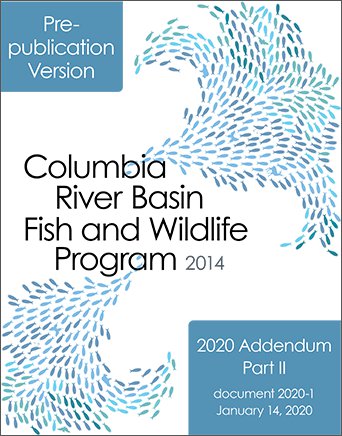Council OKs Partial Revision Of Fish And Wildlife Program, Focusing On Issues That Affect Project Implementation
- January 15, 2020
- John Harrison

At its January meeting, the Council updated its Columbia River Basin Fish and Wildlife Program to address several issues that have risen to the forefront in the region’s ongoing efforts to protect salmon, steelhead, bull trout, sturgeon, and other fish and wildlife species in the Columbia Basin.
Comments provided by federal and state agencies, Indian tribes, university researchers, and others helped guide the Council’s amendment process. The amendment adopted today provides direction to the Bonneville Power Administration, the region’s fish and wildlife managers, and others who implement the Council’s program on a project-by-project basis.
The Council was directed by Congress in the Northwest Power Act of 1980 to establish the program and update it every five years. It was last updated in 2014. The purpose of the program is to protect and enhance all fish and wildlife species in the Columbia River Basin that are adversely affected by the hydropower dams on the Columbia River and its tributaries.
“The Columbia River Basin is constantly evolving, and one of our important tasks is to react to those changes by setting priorities and updating our fish and wildlife program to improve the chances for success,” said Council Chair Richard Devlin.
Some of the project implementation issues addressed in the amendment package approved today include:
Climate Change: The Council will establish a science-policy forum on climate change to help understand the implications of climate change and how it is addressed by projects in the program, and also inform regional power and fish and wildlife decisions.
Mitigation in blocked areas: The amendment recommends that the Bonneville Power Administration, which pays for the projects that implement the Council’s program, implement a broad suite of actions to mitigate for the complete loss of salmon, steelhead, resident fish, and wildlife in the Lake Roosevelt and Spokane River areas as the result of the construction and operation of Grand Coulee and Chief Joseph dams. This includes continuing to make progress on the phased approach to salmon reintroduction above the dams that was included in the 2014 Program. Today’s amendment envisions a significant increase in the level of mitigation above the two dams while not compromising mitigation activities elsewhere in the Columbia River Basin.
The ocean: Restore and sustain funding for and implementation of ocean research at the level recommended by the Council and supported by the Independent Scientific Review Panel. Knowledge gained about conditions in the ocean and their impacts on fish help the Council and the fish and wildlife managers better plan restoration efforts in freshwater spawning and rearing habitat, and hatchery operations.
Libby and Hungry Horse dams: Implement the refinements to the operations of these dams as recommended by the Montana Department of Fish, Wildlife and Parks and the Kootenai Tribe of Idaho.
Predators: Increase and sustain the effort to assess and remove invasive Northern Pike from the Lake Roosevelt area and other parts of the basin and prevent the spread of Northern Pike to areas where salmon and steelhead are present. Federal agencies should join with the states and tribes to be sure federal legislation to reduce predation on fish by seals and sea lions is implemented, and that the effort to reduce predation on juvenile fish by fish-eating birds continues.
Project implementation: The amendment requires Bonneville to report to the Council whenever a significant change occurs in a project, either through a budget change or a change in the scope of work so that the impact on the overall program can be understood.
The Council is also working on an additional amendment package that will define goals and objectives for the program and indicators that can measure program progress. This will take place through a series of public workshops to develop these elements of the program collaboratively with fish and wildlife agencies, tribes, and the public. The Council anticipates adopting these amendments into the program later this spring. For more information please go to the Council’s website at www.nwcouncil.org.


